

Managing Risk in Career Decisions - Bill Barnett. By Bill Barnett | 12:00 PM October 1, 2012 You like your current position, and you’re doing well, but you just got a surprisingly attractive job offer.

It’s exciting. Your friends say they’re happy for you. You expect to accept the offer. But hold on just a minute. Should you take the plunge? Any new job offer is an opportunity. These risks are prevalent in any career decision, especially those that affect your financial security and personal life. Brian briefly considered starting his company on nights and weekends without giving up a regular paycheck. I had to take the full plunge. Brian’s big bet proved to be a wise choice. But big bets aren’t for everyone. James considered his options. James had three reasons for the step downward, all aligned with risk reduction. The 3 Components of Job Satisfaction. Recently, a woman approached me after I finished a keynote presentation.
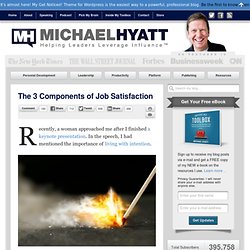
In the speech, I had mentioned the importance of living with intention. Photo courtesy of ©iStockphoto.com/TheCrimsonMonkey She got stuck on that thought and realized she had not been intentional, particularly as it related to her career. As it turns out, she was a doctor with a very successful business. She was making more money than she had dreamed possible. “If I’m honest, I think I became a doctor because my father was a doctor. Her eyes welled with tears. “But I hate it,” she continued. She was good at what she did. What’s the secret to being happy at home and fulfilled at work. Money and the Meaning of Life - Bill Taylor. By Bill Taylor | 8:00 AM May 17, 2011 Everywhere you look, there’s compelling evidence that the single-minded pursuit of wealth often leads smart people to do incredibly stupid things — things that destroy what money can’t buy.
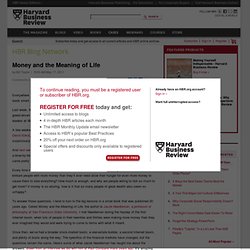
Last week, the big story was the conviction of Raj Rajaratnam on 14 counts of insider trading, a greed-driven scheme that will lead to obliterated reputations, long prison terms, or both, for senior leaders at IBM, McKinsey, and other blue-chip institutions. A few weeks before that, the big story was the resignation and humiliation of Berkshire Hathaway’s David Sokol, the likely successor to CEO Warren Buffett, undone by his eagerness to cash suspiciously timed investments in the stock of a company Berkshire later bought. Every time I read or see these sorry dispatches, I ask myself the same questions. How is it that brilliant people with more money than they’ll ever need allow their hunger for even more money to cause them to lose everything? Fast Exercises To Find Your Purpose And Passion For Work.
How to Find Your Purpose and Do What You Love. “Find something more important than you are,” philosopher Dan Dennett once said in discussing the secret of happiness, “and dedicate your life to it.”
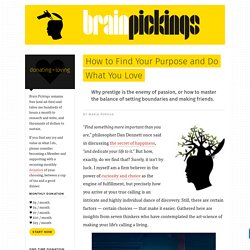
But how, exactly, do we find that? Surely, it isn’t by luck. I myself am a firm believer in the power of curiosity and choice as the engine of fulfillment, but precisely how you arrive at your true calling is an intricate and highly individual dance of discovery. Still, there are certain factors — certain choices — that make it easier. Gathered here are insights from seven thinkers who have contemplated the art-science of making your life’s calling a living. Every few months, I rediscover and redevour Y-Combinator founder Paul Graham’s fantastic 2006 article, How to Do What You Love. What you should not do, I think, is worry about the opinion of anyone beyond your friends. More of Graham’s wisdom on how to find meaning and make wealth can be found in Hackers & Painters: Big Ideas from the Computer Age. 16. Companies Should Take the Lead in Fixing the Middle-Skills Gap - Thomas Kochan, David Finegold, and Paul Osterman.
By Thomas Kochan, David Finegold, and Paul Osterman | 7:00 AM December 14, 2012 Three and a half years after the Great Recession officially ended, unemployment in the United States remains stubbornly high.
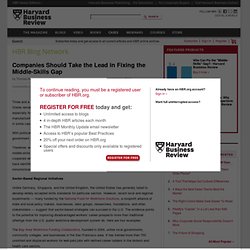
Yet many employers still struggle to fill certain types of vacancies, especially for so-called middle-skills jobs — in computer technology, nursing, high-skill manufacturing, and other fields — that require postsecondary technical education and training and, in some cases, college math courses or degrees. With political gridlock and a focus on deficit reduction likely to continue in Congress, the federal government probably won’t launch major new education and training initiatives anytime soon. Therefore, we think that companies can and should take the lead in training workers to fill the middle-skills gap. How do Careers Really Work? The Three Phases. What should I do with my life?
Have you been putting it off, are you a bit confused… or you simply have no idea what to do job-wise?
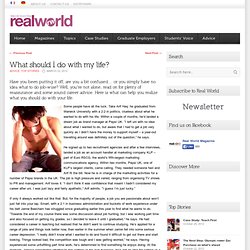
Well, you’re not alone, read on for plenty of reassurance and some sound career advice. Here is what can help you realize what you should do with your life. Some people have all the luck. Take Arif Haq: he graduated from Warwick University with a 2:2 in politics, clueless about what he wanted to do with his life. Within a couple of months, he’d landed a dream job as brand manager at Pepsi UK. He signed up to two recruitment agencies and after a few interviews, landed a job as an account handler at marketing company KLP – part of Euro RSCG, the world’s fifth-largest marketing communications agency. If only it always worked out like that. “You’re not a freak…” Jamie is not the only one battling career confusion. The trouble is if you feel you are running out of time it can become even harder to think about what to do. The quarter-life crisis Dream jobs take time.